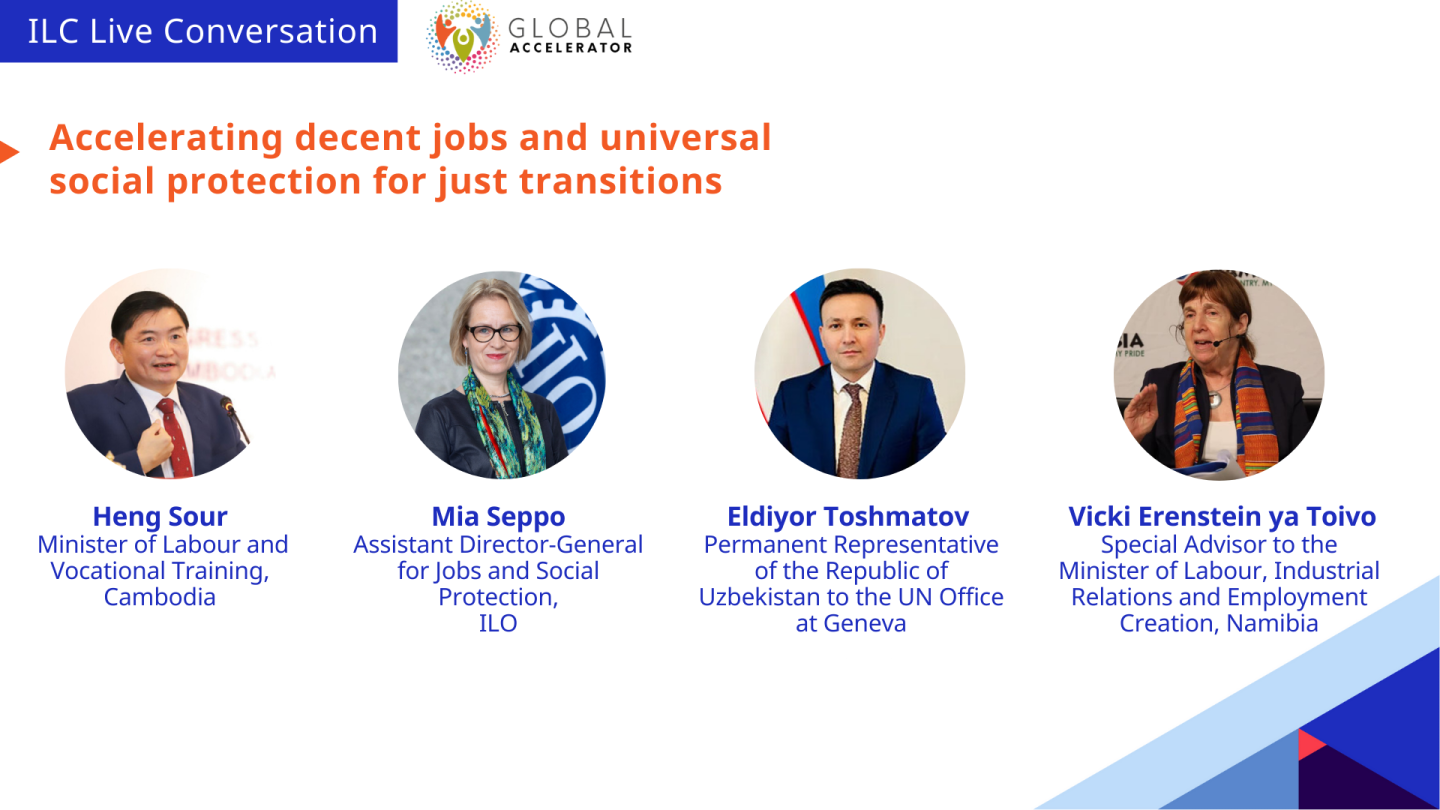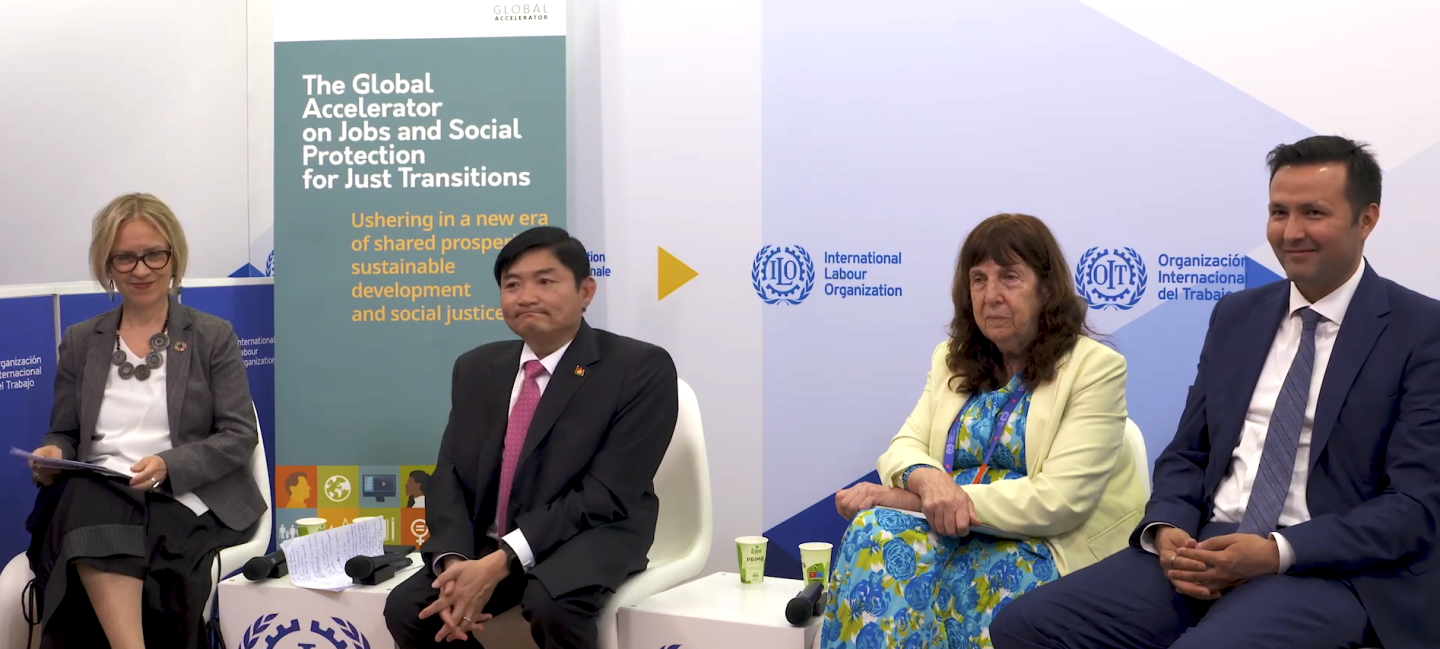Representatives of pathfinder countries of the Global Accelerator on Jobs and Social Protection for Just Transitions shared their experiences and perspectives on how the initiative supports countries to overcome persistent poverty and inequality while accelerating decent jobs and universal social protection for just transitions.

This thematic discussion on the Global Accelerator took place during the 112th International Labour Conference lunchtime conversations with the participation of:
- Mr. Heng Sour, Minister of Labour and Vocational Training, Cambodia
- Ms. Mia Seppo, Assistant Director-General for Jobs and Social Protection, ILO
- Mr. Eldiyor Toshmatov, Permanent Representative of the Republic of Uzbekistan to the UN Office at Geneva
- Ms. Vicki Erenstein ya Toivo, Special Advisor to the Minister of Labour, Industrial Relations and Employment Creation, Namibia
Partnering for SDG acceleration and just transitions
The Global Accelerator emerged as a joint UN response with the aim of accelerating economic recovery while investing in social development and preparing countries for future challenges.
Acceleration is necessary in Namibia, explained Vicki Erenstein ya Toivo, where many good policies cannot be fully implemented due to a lack of funding; the focus on transitions is very relevant, because transitions are omnipresent, whether it's the transition from school to work, or other lifecycle transitions, ecological transition, transition towards formalization of the economy, digital transformation, etc.
The Global Accelerator is an opportunity to raise the profile of decent work, universal social protection and tripartite social dialogue as key contributors to the SDG acceleration agenda, explained Mia Seppo: “The Global Accelerator, led by ILO, is really an opportunity to have the wider UN system work on the jobs and social protection transition and in doing so, increasing the understanding and recognition of the whole multilateral system of the unique mandate of a tripartite institution focusing on social dialogue.”
The Global Accelerator is not creating parallel structures but working with and through national plans, national systems, and existing coordination structures. This was confirmed by Minister Heng Sour, who highlighted: “The Global Accelerator is a mechanism that allows us to (...) maximize all the resources, including the human resources, including the finance and also the inter-ministry coordination to achieve our goal.”
Whole of government approach, tripartism and multilateral cooperation
The Global Accelerator is a prime example of a whole-of-government approach. It combines this with social dialogue and multilateral and UN-system-wide action, to focus on increasing policy coherence and generating innovative solutions.
Vicki Erenstein ya Toivo explained that for the Global Accelerator to work in Namibia, the government has introduced a much more inclusive form of social dialogue to collectively identify solutions. The national steering committee (overseen by an inter-ministerial troika of the Ministry of Labour, the Ministry of Finance and Public Enterprises, and the National Planning Commission) has organised in collaboration with key UN agencies, a series of roundtable discussions on sectors that are key for potential impact. The first two, led by the Ministries of Agriculture on the agriculture/agri-food processing sector, and the Ministry of Industralisation on the biomass value chain, respectively included ministries, institutions such as the national training authority, social partners, civil society organisations, banks, and donors. Through this broad form of national dialogue, participants were able to jointly develop concrete proposed interventions: “What we hope to achieve is that all of the government ministries, but also the other sectors of our society, come together and commit to taking joint responsibility for building our country.” This contributes to breaking the often siloed approach of government: the troika that oversees the development of the Global Accelerator includes six other Ministers in sectors that are particularly relevant for employment creation and expansion of social protection, as well as the Namibian Investment Promotion Development Board.
Minister Heng Sour stressed that inter-ministerial coordination was key for mobilizing resources and achieving strong outcomes. “When different ministries come up with their different own agendas, without referring to the integrated policy or strategies, then the finance which is key important [pillar] in the Global Accelerator, will be very limited. That's why coordinating between ministries can maximise and utilise the available funds to reach common goals.”
Beyond national coordination, the Global Accelerator is also a vehicle to increase UN coherence: “We are also increasingly working with bringing the system together for the UN to be more coherent when it comes to our policy support. I think governments are quite used to having a lot of UN agencies knocking on the door and we're trying to bring that together for greater coherence,” explained Mia Seppo.
Ambassador Eldiyor Toshmatov highlighted the important role played by ILO in coordinating the Global Accelerator and engaging IFIs in addition to UN partners: “International financial institutions are also key actors in implementing some social-oriented programs, especially in developing countries like Uzbekistan. Of course, there is a good relationship and cooperation between social partners, government, organization of employers and workers, but without engaging, without taking on board all the stakeholders you cannot achieve these ambitious goals we put ahead of us. For the time being, we have established a good cooperation between all the UN family in Uzbekistan, and ILO is playing a key role, leading role in this process. […] And we take on board the international financial institutions like World Bank, Asian Development Bank, Islamic Development Bank, etc.”
Effective financing strategies
The Global Accelerator creates connections between policies and financing, providing a strategic framework where national and local governments, social security institutions, private sector, development banks and international partners can increase investments in the social agenda and strengthen their contribution to achieving the SDGs. Combined investments in social policies create synergies that have a positive impact on growth, labour productivity, jobs, and sustainable businesses.
In Namibia, for instance, the Global Accelerator helps put employment creation and social protection at the centre of social and economic development planning, including through employment impact assessments and employment-centred budgeting, which the government is planning to institutionalise and undertake in several priority sectors, shared Vicki Erenstein ya Toivo.
Ambassador Eldiyor Toshmatov described that his government was developing a financial strategy to implement the Global Accelerator roadmap, looking at various options including ways to attract private sector investments and IFIs.
Furthermore, Mia Seppo stressed that countries are often policy-rich but implementation poor, and the way to turn this around was to have concrete and feasible financing and investment options. This included developing macroeconomic policies that are pro-employment, and support extending social protection, looking at the opportunities generated by formalization to also broadening the tax and contribution base, and many other options. She remarked that social protection and decent jobs should not be seen as a cost but as an investment which is where the ILO and UN could provide support: “How do we make sure that the public resources are used in a manner that serves the people and serves social justice? How do we make sure that we protect and extend social spending in situations of fiscal austerity? And how do we turn the paradigm around to make sure that we don't only look at social expenditures as a cost, but we look at it as an investment? And this is where ILO and its UN partners can support the conversations to really show with evidence that there are economic returns from social investment and social expenditures.”

Why should other countries join the Global Accelerator?
All three country representatives ended with some concrete advice for other countries that may consider joining the Global Accelerator. Vicki Erenstein ya Toivo stressed that the Global Accelerator was an opportunity to do things differently. “I will encourage Member States to see the Global Accelerator as an opportunity, as we have seen it. An opportunity to think out of the box, an opportunity to declare war on silos. It's not going to solve all the problems of our country, but it is an opportunity to identify a path where we can say, we are confident that we can create employment and this is how we can do it.”
Ambassador Eldiyor Toshmatov agreed that the Global Accelerator was a real opportunity to develop policies that benefitted people. Minister Heng Sour further explained that “The Global Accelerator's objective is not to create new obligations or burdens to the government, but to help each government, based on its own ambitions, to integrate and mobilize all available laws, policies, human resources, and finance to achieve the dreams that the people have. It is also a platform where all the social partners can join together”.
Watch the full video of this ILO conversation: ILO Live - The Global Accelerator on Jobs and Social Protection for Just Transitions